-
Use Cases
-
Resources
-
Pricing
Ancient Europe
Battle of Marathon
490 BCE
% complete
The Battle of Marathon, fought between the Greeks and Persians, marked a significant victory for the Greeks and secured their independence against Persian invasion.
Image source: Battle of Marathon

Fall of the Western Roman Empire
476 CE
% complete
The fall of the Western Roman Empire marked the end of ancient Rome and the beginning of the Middle Ages in Europe.
Image source: Fall of the Western Roman Empire
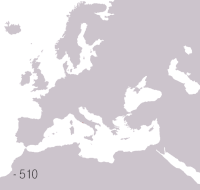
Medieval Europe
Charlemagne's Coronation as Holy Roman Emperor
800
% complete
Charlemagne's coronation as Holy Roman Emperor by Pope Leo III in Rome signified the revival of the Roman Empire in Western Europe.
Image source: Charlemagne

Norman Conquest of England
1066
% complete
The Norman Conquest led by William the Conqueror marked the beginning of Norman rule in England and brought significant political and cultural changes to the country.
Image source: Norman Conquest

Magna Carta
Jun 15, 1215
% complete
The Magna Carta was a historic document that limited the power of the English monarchy and laid the foundation for constitutional law.
Image source: Magna Carta
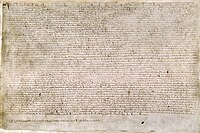
Black Death
1347 - 1351
% complete
The Black Death, a devastating pandemic caused by the bubonic plague, resulted in the deaths of millions of people across Europe and had profound social and economic consequences.
Image source: Black Death

Renaissance and Reformation
Italian Renaissance
1300 - 1699
% complete
The Italian Renaissance was a period of cultural and intellectual flourishing characterized by advancements in art, literature, science, and philosophy.
Image source: Italian Renaissance

Gutenberg's Printing Press
1440
% complete
Johannes Gutenberg's invention of the printing press revolutionized the spread of knowledge and played a crucial role in the dissemination of ideas during the Renaissance and Reformation.
Image source: Johannes Gutenberg

Protestant Reformation
1517 - 1648
% complete
The Protestant Reformation, initiated by Martin Luther's Ninety-Five Theses, led to a widespread religious and theological upheaval, challenging the authority of the Catholic Church and resulting in the establishment of Protestant denominations.
Image source: Reformation
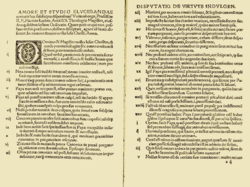
Thirty Years' War
1618 - 1648
% complete
The Thirty Years' War, a complex conflict involving religious, political, and territorial disputes, devastated Europe and reshaped the balance of power on the continent.
Image source: Thirty Years' War

Enlightenment and Modern Europe
Industrial Revolution
1700 - 1899
% complete
The Industrial Revolution brought about significant advancements in manufacturing, technology, and transportation, transforming Europe's economic and social landscape.
Image source: Industrial Revolution

French Revolution
1789 - 1799
% complete
The French Revolution was a period of radical political and social upheaval in France, leading to the overthrow of the monarchy and the rise of Napoleon Bonaparte.
Image source: French Revolution

Congress of Vienna
1814 - 1815
% complete
The Congress of Vienna aimed to restore stability and redraw the political map of Europe after the Napoleonic Wars, shaping the balance of power for the next century.
Image source: Congress of Vienna
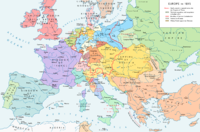
World War I
1914 - 1918
% complete
World War I, triggered by a series of political and territorial conflicts, was a global conflict that resulted in unprecedented devastation and set the stage for significant geopolitical changes.
Image source: World War I
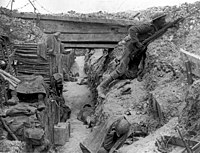
Treaty of Versailles
Jun 28, 1919
% complete
The Treaty of Versailles, signed at the end of World War I, imposed harsh terms on Germany and laid the foundation for future conflicts and tensions.
Image source: Treaty of Versailles

World War II
1939 - 1945
% complete
World War II, the deadliest conflict in human history, involved nations from around the globe and resulted in the Holocaust, the use of atomic weapons, and the reshaping of the world order.
Image source: World War II

Fall of the Berlin Wall
Nov 9, 1989
% complete
The fall of the Berlin Wall symbolized the end of the Cold War and the reunification of East and West Germany, marking a significant turning point in European history.
Image source: Fall of the Berlin Wall

Key Facts
- The Renaissance period marked a rebirth of culture and learning in Europe in the 15th and 16th centuries.
- The Reformation in the 16th century led to religious conflicts and the establishment of Protestantism as a separate branch of Christianity.
- The Age of Exploration in the 15th and 16th centuries brought about significant global expansion and colonization by European powers.
- The French Revolution in the late 18th century marked the beginning of modern political and social changes in Europe.
- The World Wars in the 20th century had a profound impact on Europe, leading to changes in borders, ideologies, and global power dynamics.
Source
This AP European History timeline was generated with the help of AI using information found on the internet.
We strive to make these timelines as accurate as possible, but occasionally inaccurates slip in. If you notice anything amiss, let us know at [email protected] and we'll correct it for future visitors.
Create a timeline like this one for free
Preceden lets you create stunning timelines using AI or manually.
Customize your timeline with one of our low-cost paid plans
Export your timeline, add your own events, edit or remove AI-generated events, and much more
Free
$
0
free forever
No credit card required.
Basic
$
10
/month
billed annually
Cancel anytime.
Pro
$
16
/month
billed annually
Cancel anytime.
Common Questions
Can I cancel anytime?
Yes. You can cancel your subscription from your account page at anytime which will ensure you are not charged again. If you cancel you can still access your subscription for the full time period you paid for.
Will you send an annual renewal reminder?
Yes, we will email you a reminder prior to the annual renewal and will also email you a receipt.
Do you offer refunds?
Yes. You can email us within 15 days of any payment and we will issue you a full refund.
What if I have more questions?
Check out our pricing docs or send us an email anytime: [email protected].